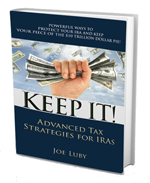Liquidity is NOT a Benefit
Categories: Investment Strategies, Wealth Transfer StrategiesI continue to see many references to liquidity touted as an investment benefit. In fact, it’s often suggested to be the most important benefit when considering different investment choices. It’s mentioned as such in news articles, online discussions and even some conference presentations. This is unfortunate for the advancement of industry knowledge and understanding because frankly, it’s wrong. Especially considering that most references of this type also declare illiquidity as an automatic detractor.
The amount of liquidity inherent in a particular investment is merely a FEATURE. It is not specifically a benefit or detriment. Some investments have high liquidity in that they can be traded most days on open exchanges. Others do not trade at all and still more have various limited liquidity options via redemption or buyback programs. In each case, the particular liquidity of the asset is merely a feature specific to that asset.
Assume Bill has one million dollars cash. No argument that his portfolio is completely liquid. His friend Kevin owns a local McDonald’s restaurant franchise for which he paid one million dollars. Since the restaurant is wholly owned by Kevin and does not trade on an exchange, he “suffers” from complete illiquidity. Who is better off? No doubt some will say Bill, others will say Kevin (especially those who enjoy a Big Mac now and again) but many will come up short in trying to choose between the two.
If liquidity is the most important consideration, or at least the initial and primary consideration before looking at asset type and other criteria, then shouldn’t Bill automatically be in the best position? Yet no one would advocate holding all of one’s assets in cash to satisfy the liquidity-is-best mantra.
Lest anyone think I’m not being fair because Bill holds cash and doesn’t really have an investment to compare, let’s change the scenario a bit. Bill now buys one million dollars of publicly traded McDonalds Corporation stock. Who is better off in this new scenario? It is impossible to answer on the grounds of liquidity alone which is how many outlets try to frame the issue.
The fact is that both investments have benefits and deficiencies based on their liquidity FEATURES. If Bill simply holds the shares for five years, he has realized no benefit from the fact they could have been sold during that time. If Kevin keeps the restaurant five years, then just as Bill did not realize a benefit from the liquidity of his shares, neither does Kevin realize a detriment from the illiquidity of his franchise. That eliminates the argument referenced in the first paragraph that liquidity is always a benefit and illiquidity always a detractor.
Liquidity is the feature that affords the benefit of being able to reallocate monies to other priorities quickly. A client with fifty thousand dollars of a liquid investment may decide she would rather apply those funds toward a new automobile. The liquid nature of the investment provides her the opportunity to move quickly. Again, liquidity is the feature, buying the automobile when she desires is the benefit. Similarly, she may own fifty thousand dollars of an illiquid investment which she desires to transfer to her grandchild as a gift. She does not want the grandchild to be able to convert the asset to cash right away and spend the money foolishly. Thus, illiquidity is the feature and protecting the grandchild from being a spendthrift is the benefit.
The real underlying questions of whether a particular investment is appropriate for a particular investor must go much deeper than one specific feature of said investment. Investments are simply tools used to accomplish various financial results. Just as carpentry tools have different features allowing them to provide different benefits (hammers pound nails, saws cut wood, etc.), so it is with investments. Degree of liquidity is merely an investment feature providing different benefits which must be weighed together with myriad other criteria when selecting appropriate holdings for specific clients. When you hear someone demonize an illiquid investment and glorify a liquid one, please help set the record straight and frame the issue properly.
Author: Joe Luby, CFP®
©2012 All rights reserved.


 The title of this piece probably goes against everything you’ve ever been told or read about prohibited transactions and IRAs. That’s because (almost) everything you’ve ever been told or read about these transactions is incorrect. Calm down, control your breathing, it’s going to be OK. We’ll get through this together. I used to believe that all prohibited transactions disqualified an IRA also because that’s what I had always heard or read. That was before a very knowledgeable ERISA attorney corrected me and caused me to review the rules again in an attempt to prove him wrong. Instead, the rules proved him right.
The title of this piece probably goes against everything you’ve ever been told or read about prohibited transactions and IRAs. That’s because (almost) everything you’ve ever been told or read about these transactions is incorrect. Calm down, control your breathing, it’s going to be OK. We’ll get through this together. I used to believe that all prohibited transactions disqualified an IRA also because that’s what I had always heard or read. That was before a very knowledgeable ERISA attorney corrected me and caused me to review the rules again in an attempt to prove him wrong. Instead, the rules proved him right.
